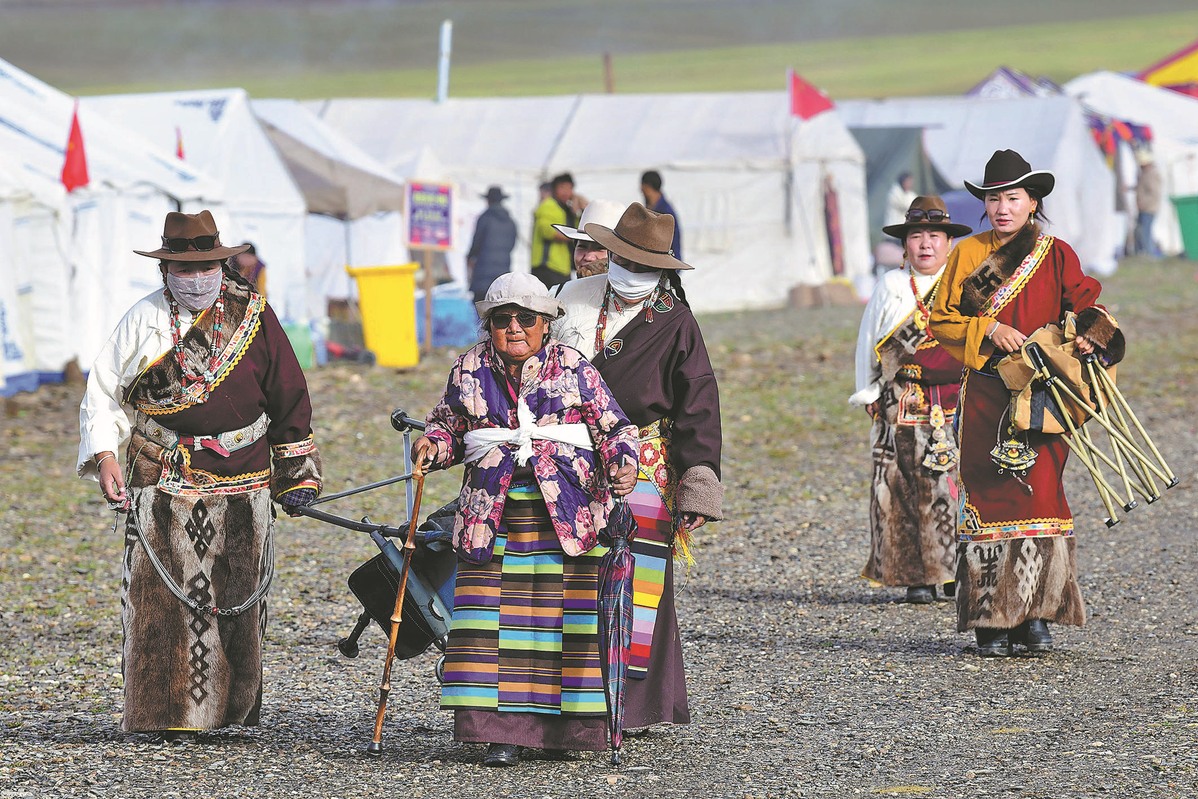
Tibetan herders attend a tourism promotion event in Nyima county, Xizang autonomous region, on Aug 25. WANG ZHENG/FOR CHINA DAILY
LHASA, Sept. 19, 2024 -- Sitting around a dining table, people of different ages were talking about 12 willows thousands of kilometers away in Southwest China's Xizang autonomous region.
"It took years for their trunks to grow this thick," said Wang Yue, 66, scooping his hands into the size of a ping-pong ball.
Gao Shengmin, 58, said, "When I was there, they grew as thick as the width of your average bowl."
Gao Shuai, 44, said, "The trees are still alive with their branches trimmed, as they have almost reached the rooftop."
Every one of the diners from China National Offshore Oil Corporation is or was a cadre sent to Nyima county, a pastoral area with an average altitude of more than 4,800 meters, as part of China's national paired assistance to help the development of Xizang.
Thirty years ago, the central government decided to rally national support for Xizang. Under the assistance policy, some organs of the central government, provincial-level regions and centrally-administered State-owned enterprises were designated to assist the region. Since then, cadres from government and enterprise units have taken turns to work on the plateau, greatly contributing to its development.
With thin air, strong winds and harsh climate, Nyima has no naturally growing trees in the county seat.
"Those trees managed to survive because they were planted in an indoor courtyard of our office building, like a greenhouse," Wang explained.
As one of the first cadres sent by the CNOOC from the coastal city of Tianjin to Nyima, Wang arrived in the county in 2002 when the infrastructure was still poor. As executive deputy head of the county, he contributed to constructing major roads, the government office building and a hotel. The willows were planted following the completion of the government building project.
In the hotel they installed the first elevator in northern Xizang.
In 2004, Lyu Ming, also from Tianjin, took over Wang's work in the county. He recalled that driving from the regional capital, Lhasa, took two days to Nyima because there were no paved roads.
"Once, we lost our way and drove into a waterway," he said.
"Fortunately, a passing vehicle helped drag us out of the mud."
During Lyu's term from 2004 to 2007, Nyima got access to the national power grid and the telecommunication networks, ending the days when he could not call his family in Tianjin.
By 2010, when Gao Shengmin took over the baton, the infrastructure in Nyima county had significantly improved, with assistance efforts shifting from infrastructure construction to nurturing talent and stimulating industrial growth.
"The mortality rate for newborns dropped from 20 percent to zero the first year after we organized training outside the region for local medical staff," he said with pride.
Fu Xiaoyu, who arrived in the county in August 2019, witnessed Nyima eradicate absolute poverty later in the year — a historic achievement for the county.
He and his colleagues strengthened efforts to develop the animal husbandry and tourism sectors, including the construction of a hotel at a lake resort. They also helped Tibetan college graduates get employed outside the region.
Champa, born in 1995 in Nyima county, is one of them. He became an offshore oilfield operator in the Bohai Sea in 2020, 2 years after graduating from university.
"Inspired by my experience, several of my folks have found rewarding jobs outside the plateau," Champa said with a smile.
Over the last 22 years, the CNOOC has dispatched 16 cadres to work in Nyima, and 570 million yuan ($80 million) was poured into helping its development. From 2002 to last year, the county's GDP surged 10-fold, with the poverty rate plummeting from 25 percent to zero.
Data showed that between 1994 and 2020, 52.7 billion yuan was injected into Xizang through the policy of paired assistance, involving 6,330 projects.
Carrying on the projects, Gao Shuai and his colleague Sun Peng are continuing in rural vitalization efforts and operating the lakeside hotel in Nyima.
"We must spend every penny properly to bring substantial benefits to the county and the lives of local people," Sun said.
Xinhua


